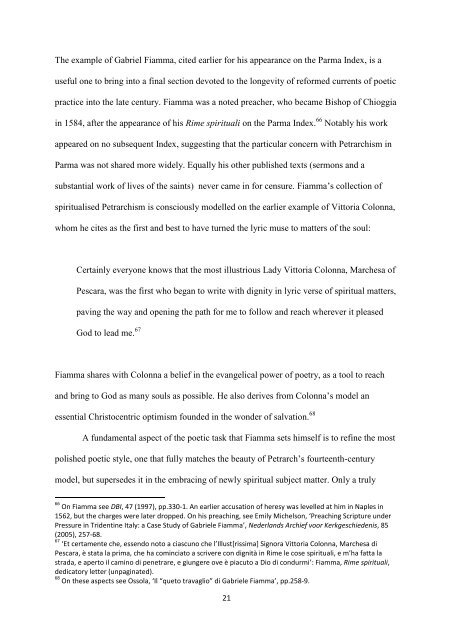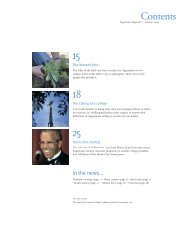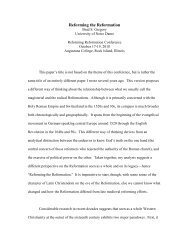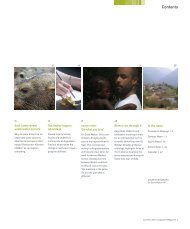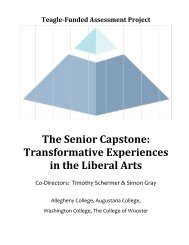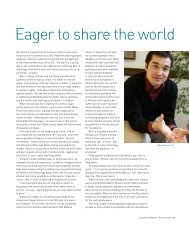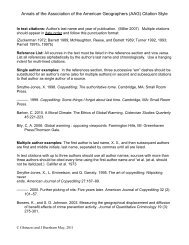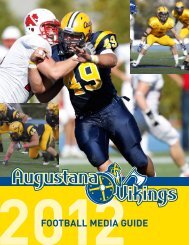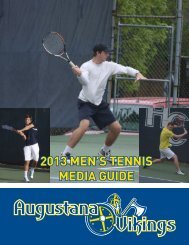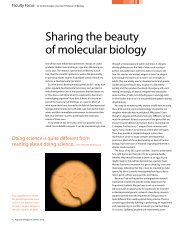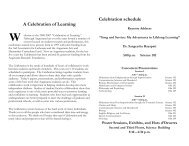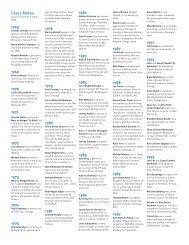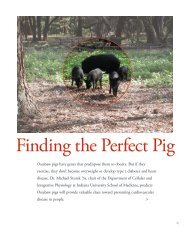Re-Writing Trent, or What Happened to Italian Literature in the Wake ...
Re-Writing Trent, or What Happened to Italian Literature in the Wake ...
Re-Writing Trent, or What Happened to Italian Literature in the Wake ...
You also want an ePaper? Increase the reach of your titles
YUMPU automatically turns print PDFs into web optimized ePapers that Google loves.
The example of Gabriel Fiamma, cited earlier f<strong>or</strong> his appearance on <strong>the</strong> Parma Index, is a<br />
useful one <strong>to</strong> br<strong>in</strong>g <strong>in</strong><strong>to</strong> a f<strong>in</strong>al section devoted <strong>to</strong> <strong>the</strong> longevity of ref<strong>or</strong>med currents of poetic<br />
practice <strong>in</strong><strong>to</strong> <strong>the</strong> late century. Fiamma was a noted preacher, who became Bishop of Chioggia<br />
<strong>in</strong> 1584, after <strong>the</strong> appearance of his Rime spirituali on <strong>the</strong> Parma Index. 66 Notably his w<strong>or</strong>k<br />
appeared on no subsequent Index, suggest<strong>in</strong>g that <strong>the</strong> particular concern with Petrarchism <strong>in</strong><br />
Parma was not shared m<strong>or</strong>e widely. Equally his o<strong>the</strong>r published texts (sermons and a<br />
substantial w<strong>or</strong>k of lives of <strong>the</strong> sa<strong>in</strong>ts) never came <strong>in</strong> f<strong>or</strong> censure. Fiamma‟s collection of<br />
spiritualised Petrarchism is consciously modelled on <strong>the</strong> earlier example of Vitt<strong>or</strong>ia Colonna,<br />
whom he cites as <strong>the</strong> first and best <strong>to</strong> have turned <strong>the</strong> lyric muse <strong>to</strong> matters of <strong>the</strong> soul:<br />
Certa<strong>in</strong>ly everyone knows that <strong>the</strong> most illustrious Lady Vitt<strong>or</strong>ia Colonna, Marchesa of<br />
Pescara, was <strong>the</strong> first who began <strong>to</strong> write with dignity <strong>in</strong> lyric verse of spiritual matters,<br />
pav<strong>in</strong>g <strong>the</strong> way and open<strong>in</strong>g <strong>the</strong> path f<strong>or</strong> me <strong>to</strong> follow and reach wherever it pleased<br />
God <strong>to</strong> lead me. 67<br />
Fiamma shares with Colonna a belief <strong>in</strong> <strong>the</strong> evangelical power of poetry, as a <strong>to</strong>ol <strong>to</strong> reach<br />
and br<strong>in</strong>g <strong>to</strong> God as many souls as possible. He also derives from Colonna‟s model an<br />
essential Chris<strong>to</strong>centric optimism founded <strong>in</strong> <strong>the</strong> wonder of salvation. 68<br />
A fundamental aspect of <strong>the</strong> poetic task that Fiamma sets himself is <strong>to</strong> ref<strong>in</strong>e <strong>the</strong> most<br />
polished poetic style, one that fully matches <strong>the</strong> beauty of Petrarch‟s fourteenth-century<br />
model, but supersedes it <strong>in</strong> <strong>the</strong> embrac<strong>in</strong>g of newly spiritual subject matter. Only a truly<br />
66 On Fiamma see DBI, 47 (1997), pp.330-1. An earlier accusation of heresy was levelled at him <strong>in</strong> Naples <strong>in</strong><br />
1562, but <strong>the</strong> charges were later dropped. On his preach<strong>in</strong>g, see Emily Michelson, ‘Preach<strong>in</strong>g Scripture under<br />
Pressure <strong>in</strong> Trident<strong>in</strong>e Italy: a Case Study of Gabriele Fiamma’, Nederlands Archief vo<strong>or</strong> Kerkgeschiedenis, 85<br />
(2005), 257-68.<br />
67 ‘Et certamente che, essendo no<strong>to</strong> a ciascuno che l’Illust*rissima+ Sign<strong>or</strong>a Vitt<strong>or</strong>ia Colonna, Marchesa di<br />
Pescara, è stata la prima, che ha com<strong>in</strong>cia<strong>to</strong> a scrivere con dignità <strong>in</strong> Rime le cose spirituali, e m’ha fatta la<br />
strada, e aper<strong>to</strong> il cam<strong>in</strong>o di penetrare, e giungere ove è piacu<strong>to</strong> a Dio di condurmi’: Fiamma, Rime spirituali,<br />
dedicat<strong>or</strong>y letter (unpag<strong>in</strong>ated).<br />
68 On <strong>the</strong>se aspects see Ossola, ‘Il “que<strong>to</strong> travaglio” di Gabriele Fiamma’, pp.258-9.<br />
21


